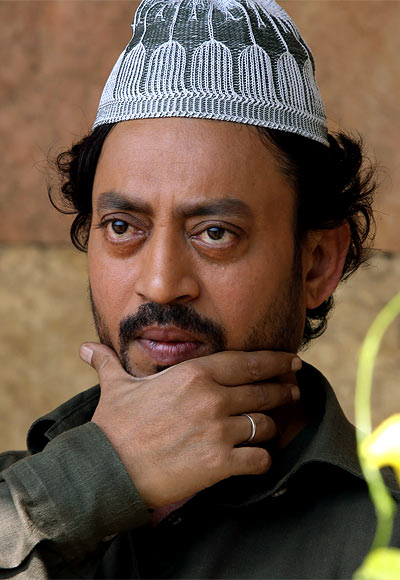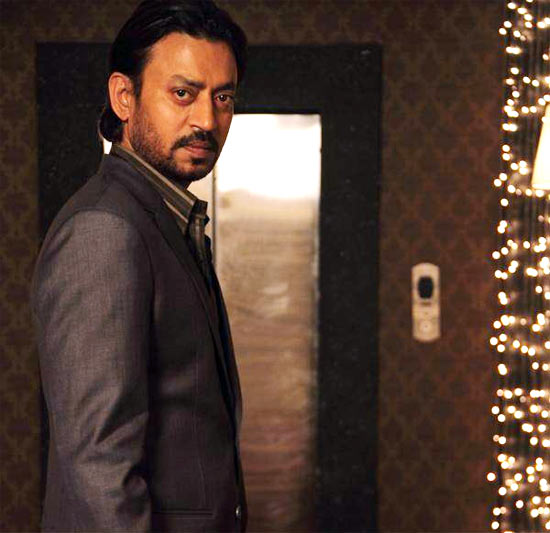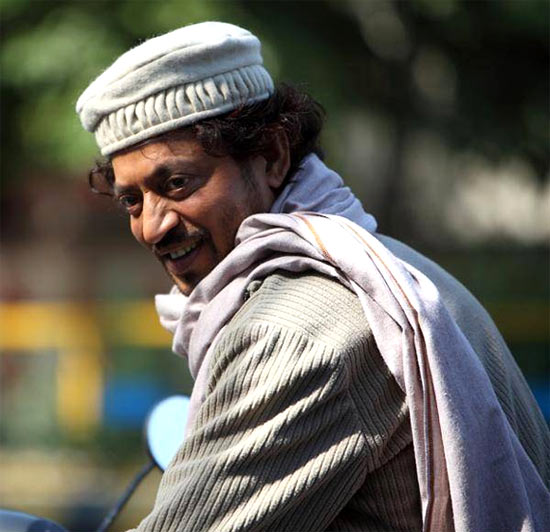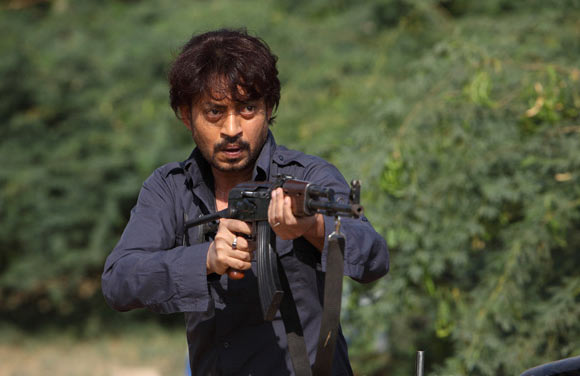 | « Back to article | Print this article |
'My biggest fear is to not know what film I would do next'
He usually plays unconventional roles, but this time, Irrfan Khan stars in an unabashedly commercial film, D Day.
Irrfan plays a RAW agent in the film directed by Nikhil Advani, which also stars Rishi Kapoor, Arjun Rampal, Shruti Haasan and Huma Qureshi.
Irrfan talks to Sonil Dedhia about doing D Day, the changes that he has seen in his 25-year-long career and why box office success matters to him.
What attracted you to do a film like D Day?
Initially, I wasn’t sure whether I wanted to be a part of this film. Nikhil (Advani) has made completely different films in the past and I just wanted to be assured that whatever was mentioned in the script of D-Day would be there when we shoot the film
It was my greed and temptation to do this film that made me test him.
And when did you feel assured?
When Nikhil started living up to his promises. He had told me that he would bring Hollywood stunt director Tom Struthers from London, and he did it.
He started giving me detailed references for each shot and how he would execute it. I could feel that he isn’t bluffing.
'I never follow a pattern so there is no fear of losing my audience'
Karan Johar recently praised you on Twitter. He tweeted, ‘Irrfan is possibly the acting barometer of Indian cinema. His silence screams...his every pause resonates...he is calibre personified.’
These definitions don’t remain with you always. These are ‘time being’ definitions. It is heartening that people acknowledge me for what I am doing. It’s engaging them, entertaining them.
At this point of time, my concern is that I should keep getting interesting and entertaining work.
I don’t want to be the highest paid actor. The only thing I want is that whatever work I am doing, it should give me enough to enjoy my life.
Has your stardom ever overpowered your choice of films?
I never follow a pattern so there is no fear of losing my audience. People who follow a pattern become more conscious about choosing a film according to it.
I have been choosing all kinds of films and it’s my instinct that is working for my producer, my audience and me.
You have been in the industry for 25 years. Has the industry changed its perception of you?
The response from the industry has always been positive. I think it was I who was creating a kind of conflict.
I wasn’t ready to do what the industry was offering me. It created an atmosphere where filmmakers were confused about what I was looking for.
It was always me looking for a particular kind of role because I didn’t have any path to follow. I was trying to create a path for myself and if you do that in any field, it will have its own challenges.
'You have to be naked and vulnerable in front of the camera'
Were there moments when you were unsure or doubted yourself?
Being unsure is always a part of an actor. You are not always sure and that’s what brings out the freshness in your performance.
I have seen directors who are vulnerable and naked in front of the story. They don’t know where to go; they are groping and trying to understand. Those stories are fresher than those of people who are pretty sure of what they want and there is no freshness in their work.
When an actor is too sure about himself, there is no surprise. You have to be naked and vulnerable in front of the camera. You shouldn’t know what’s to happen.
In a recent interview you mentioned that early in your career you carried your photos around and tried to look glamorous…
(Interrupts) In the initial days, I didn’t know how to approach and connect with the directors and ask for work. It was the norm that if you wanted to become an actor, you had to click pictures and make a portfolio. I did that too.
I got my portfolio clicked and started approaching directors. I went to production houses, calling them and showing them my pictures.
But that was very humiliating for me. I realised that this isn’t working for me and I have to find some other way.
'During my growing up days we weren't allowed to watch too many films'
Do you still make an effort to look glamorous?
If a role demands it, or if I am doing a photo shoot for a magazine, then I have to look glamorous. It’s part of my job to look glamorous. And, at times, non-glamorous too.
What were the early influences of cinema on you?
I didn’t have too much choice. During my growing up days, we weren’t allowed to watch too many films. The films that I was able to watch were some re-runs of Dilip Kumar and Moti Lal’s old films. Both these actors have left a huge impression on me.
After joining NSD (National School of Drama), I was able to watch some films of Mithun Chakraborty and Naseeruddin Shah.
Do you remember meeting an actor for the first time and perhaps taking an autograph?
(Thinks hard) I remember meeting a cricketer and not an actor. I had gone to see a friendly cricket match between India and Pakistan at Sawai Mansingh Stadium in Jaipur. I met Pakistani cricketer Zaheer Abbas. He was returning to the pavilion after batting and somehow my friends and I managed to go on the field. I ran to him asking for his autograph.
I also remember watching the shooting of Amitabh Bachchan’s Ganga Ki Saugandh in Jaipur. I also saw the shooting of a film called Jal Mahal, which starred Jeetendra and Rekha.
When I came to Mumbai, Juhu used to be very thinly populated and there was hardly any traffic. A lot of shootings would happen there. I remember meeting Vijendra Ghatge.
I remember every actor back then used to have shiny hair and red cheeks (laughs). I saw Jayshree T when I somehow once sneaked into Filmistan Studios.
'I am not scared of losing anything'
Is the box office a barometer for you?
Yes, and I think it applies for every actor. You could be the world’s best actor but if your films are not working you will have limited appeal.
It is the choices that you make that make you a good or bad actor. You could be a good actor but if you don’t choose interesting films, you will never be remembered.
Do you fear losing your stardom or your instincts going wrong?
I haven’t thought about it. This fear hasn’t come because I feel I have just started. I am still waiting for the story that I want to do.
I don’t think I have created something too huge and that I am scared of being demolished. I am not scared of losing anything.
My biggest fear is to not know what film I would do next.




